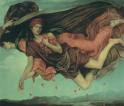
AITHER (or Aether) was the Protogenos (first-born elemental god) of the bright, glowing upper air of heaven - the substance of light. Above him lay the solid dome of the sky-god, Ouranos, and below, the transparent mists of earth-bound air. In the evening his mother Nyx drew her veil of darkness between the aither and the aer to bring night to man. In the morning his sister-wife Hemera dispersed these mists, revealing the shining blue aither of day. Night and day were regarded as quite independent of the sun in the ancient cosmogonies.
Aither was one of the three "airs". The middle air was Aer or Khaos, a colourless mist which enveloped the mortal world. The lower air was Erebos, the mists of darkness, which enveloped the dark places beneath the earth and the realm of the dead. The third was the upper air of aither, the mist of light, home of the gods of heaven. It enveloped the mountain peaks, clouds, stars, sun and moon. The stars themselves were said to be formed from the concentrated fires of aither.
His female counterpart was Aithre, Titanis of the Clear Blue Sky, mother of the Sun and Moon.
ENCYCLOPEDIA
AETHER (Aithêr), a personified idea of the mythical cosmogonies. According to that of Hyginus (Fab. Pref. p. 1, ed. Staveren), he was, together with Night, Day, and Erebus, begotten by Chaos and Caligo (Darkness). According to that of Hesiod (Theog. 124), Aether was the son of Erebus and his sister Night, and a brother of Day. (Comp. Phornut. De Nat. Deor. 16.) The children of Aether and Day were Land, Heaven, and Sea, and from his connexion with the Earth there sprang all the vices which destroy the human race, and also the Giants and Titans. (Hygin. Fab. Prof. p. 2, &c.) These accounts shew that, in the Greek cosmogonies, Aether was considered as one of the elementary substances out of which the Universe was formed. In the Orphic hymns(4) Aether appears as the soul of the world, from which all life emanates, an idea which was also adopted by some of the early philosophers of Greece. In later times Aether was regarded as the wide space of Heaven, the residence of the gods, and Zeus as the Lord of the Aether, or Aether itself personified. (Pacuv. ap. Cic. de Nat. Deor. ii. 36, 40; Lucret. v. 499; Virg. Aen. xii. 140, Georg. ii. 325.)
In Hesiod's Theogony
In Hesiod's Theogony, he was the son of Erebus and Nyx and brother of Hemera. Both were noted in passing in Cicero's De Natura deorum, but Hyginus Pref mentioned Khaos as his parent. The aether was also known as Zeus' defensive wall, the bound that locked Tartarus from the rest of the cosmos.
Aether had several offspring, but Hyginus seems to confuse him with Ouranos when saying that Aether had Uranus by Gaia, his daughter. Aergia, a goddess of sloth and laziness, is the daughter of Aether and Gaia. Hyginus is also our source for telling us that Aether is the father of Ouranos and Gaia. But another source tells us that it is just Ouranos who is his child. And like Tartaros and Erebos, in Hellas he might have had shrines but no temples and probably no cult either. In the Orphic hymns, he is mentioned as the soul of the world from which all life emanates. Callimachus, in calling Ouranus Akmonides, claims him as the son of Akmon, and Eustathius in Alcman tells us that the sons of Ouranos were called Akmonidai.









Tidak ada komentar:
Posting Komentar